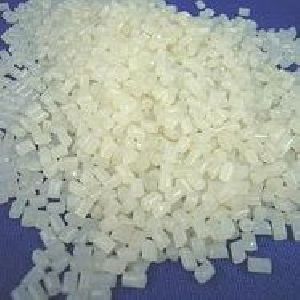
tpe granules
Thermoplastic Elastomers (TPE) sometimes referred to as thermoplastic rubbers(TPR) are a family of polymers that can be repeatedly stretched without permanently deforming the shape of the part. Unlike rubber-like elastomers, they do not require curing or vulcanization, as they are true thermoplastics. Thermoplastic elastomers (TPEs) may be processed by conventional thermoplastic techniques such as injection molding, extrusion and blow molding. Thermoplastic elastomers have replaced rubber in many applications, most importantly the automotive industry. There are six main thermoplastic elastomer groups found commercially; styrenic block copolymers, polyolefin blends (TPOs), elastomeric alloys, thermoplastic polyurethanes (TPUs), thermoplastic copolyesters and thermoplastic polyamides. Features Good Flexibility Good Adhesion Resistance Recyclable Material Good Colorability Good Processability Applications Sporting Goods Consumer Goods Gaskets General Purpose goods Medical/Healthcare Applications Automotive Interior & Exterior Parts Tubing
...more
nylon 6
Nylon 6 or polycaprolactam is a polymer developed to reproduce the properties of nylon 6,6 without violating the patent on its production.It is a semi crystalline polyamide. Unlike most other nylons, nylon 6 is not a condensation polymer, but instead is formed by ring-opening polymerization; this makes it a special case in the comparison between condensation and addition polymers. Its competition with nylon 6,6 and the example it set have also shaped the economics of the synthetic fiber industry. Properties: Nylon 6 fibres are tough possessing high tensile strength, as well as elasticity and lustre wrinkle proof highly resistant to abrasion and chemicals such as acids and alkalis. The fibres can absorb up to 2.4% of water, although this lowers tensile strength. The glass transition temperature of Nylon 6 is 47 °C. As a synthetic fiber, Nylon 6 is generally white but can be dyed to in a solution bath prior to production for different color results. Its tenacity is between 6 and 8.5 gm/den with a density of 1.14 gm/cc. Its melting point is at 215 °C and can protect heat up to 150 °C on average USES: Gears, fittings, and bearings In automotive industry for underthehood parts Material for power tools housings. Nylon 6 is used as thread in bristles for toothbrushes, surgical sutures, and strings for acoustic and classical musical instruments, including guitars, sitars, violins, violas, and cellos. In Manufacturing a large variety of threads, ropes, filaments, nets, and tire cords, as well as hosiery and knitted garments
...more